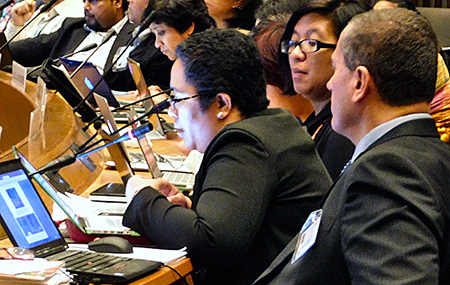Regional Priorities for Implementation: AP-RCEM Women’s Constituency Statement at APFSD
Date:
Delivered by Malyn Ando, Asian-Pacific Resource and Research Centre for Women (ARROW)

We, the Women’s Constituency, represent 97 organisations from the Asia and the Pacific region. Our diversity is our strength, and we call for the full recognition and affirmation of women’s rights as human rights, including for lesbian, bisexual, and transwomen, women living with disabilities, sex workers, women in informal and precarious work, women living with and affected by HIV and AIDS, urban poor, those living in informal settlements, farmers, fisher folk, rural and remote women, indigenous women, dalits, migrants, widows, the girl child, young women, older women, heterosexual women, and women who head households, at all stages of their lives.
We associate with the joint statement and reiterate the need for a more ambitious roadmap to be jointly developed over the next 12 months and to elevate the ambition of the APFSD. Women’s rights movements offer our assistance in this collective endeavour.
Several regional priorities identified in the document are essential in advancing women’s human rights. Overcoming the vast and growing inequalities of wealth,where 0.001% of the population owns 30% of the region’s wealth, owning 17 times more wealth than the least developed countries in Asia combined. With women representing the majority of the economically poor, we must urgently address the economic and political instruments and rules causing these gaps: privatisation of public goods and services, growing reliance on public private partnerships, land-grabbing, tax and investment rules that advantage foreign investors and the trade agreements that cement those rules, erode national sovereignty and threaten the commitments made in Agenda 2030.
While you have recognised gender inequality as a major barrier in the region the document misses key barriers to women’s human rights. Inequality is not an accident. It persists because of patriarchal norms that permeate our public and private lives.
We must recognise the intersectionality of barriers to women’s rights like climate change, that deepens gender inequality, the absence of living wages, which is a core element of economic empowerment for women, as is universal social protection. We know that violence against women is reduced when women have access and control over land (as our opening speaker said), and critically we cannot ignore the fact that religious fundamentalists and extremists hold sway over our public policies and laws, and where a young woman’s schooling ends abruptly to uphold customs such as forced and early marriages and fear of promiscuity. Overall, sexual and reproductive rights, and the need to address unsafe abortion, HIV and AIDS, and other health issues are clearly missing from the document.
Rising to these challenges will require going beyond ‘quick fixes,’ and moving to an intersectionality approach that tackles structural inequities and analyses the political, physical, ecological, economic, cultural and social dimensions of these overlapping concerns, through a holistic frame. Bringing together different sectors, alliances, and government ministries is needed to ensure a truly transformative agenda for gender, social, ecological, and economic justice in the Asia and the Pacific, and globally.
We offer you a set of key recommendations which will be annexed to this statement and we call on you to demonstrate leadership, and show the rest of the world you are delivering on your promise to achieve gender equality and the empowerment of all women. We call for gender justice as a core component of Development Justice!
RECOMMENDATIONS
- Ensure that laws and policies are gender-response and uphold women’s rights, and repeal of those that are discriminatory, or contravene basic human rights principles, whether in our constitutions or in ratified international human rights conventions.
- Address persistent issues faced by women across the region that would hinder fulfillment of sustainable development goals through:
- recognition of women’s multiple burden, valuing of unpaid care work, and provision of decent work, living wage, and equal pay
- ensuring women are able to inherit, own and control assets, property, land, fishing rights, and other productive resources, as well as access credit and technology
- changing social and cultural norms, as well as regulating excessive marketing of unhealthy and non-nutritious, and over-processed food, that exacerbate women’s vulnerability to hunger and malnutrition in all forms
- strengthening policies, legislations, and institutions to end all forms of violence and discrimination across all systems and institutions, including gender-based and sexual violence, early and child marriage and other harmful traditional practices
- ensuring access to and investments for universal health care—a critical component of which is quality and comprehensive sexual and reproductive health information and services, as well as affordable medicines—available throughout the life cycle, in all locations and contexts as well as scaling up of measures and investments to end the epidemics of AIDS, TB, Malaria, Hepatitis and other communicable disease
- reviewing and repealing laws that criminalise voluntary abortion, and remove all legal and implementation barriers to ensuring access to safe, comprehensive, free, sensitive and high-quality procedures for pregnancy termination, free of marital and/or parental consent requirements
- provision of universal primary education, as well as comprehensive sexuality education in and out of school settings
- provision of support, measures, and resources to enable decision-making and political participation of diverse women, particularly those who are committed to gender equality, at all levels this includes rights-based leadership training and intergenerational learning
- These should be prioritised in national sustainable development strategies and plans, with sufficient budgetary allocations and appropriate review and monitoring.
- Provide an enabling environment is critical, and support of women’s human rights defenders and protection of their rights from both State and non-State actors. Achieving full access to justice would necessitate reform of socio-cultural institutions and accountability for rights violations, including redress mechanisms.
- Ensure meaningful and institutional participation of civil society, particularly of diverse women’s rights groups, as equal partners in sustainable development at the regional, national and local levels.